Bitdefender is a household name in the cybersecurity industry. While its antivirus is state-of-the-art, many are wondering about its VPN. Should you buy Bitdefender VPN or ExpressVPN, a provider known for impressive qualities and features? That’s exactly the topic of today’s discussion.
ExpressVPN is a provider known for lightning-fast speeds and intuitive apps. It’s also incredibly safe and secure, with a policy against logs that many admire. Bitdefender VPN is a new player on the field. However, it brought some serious firepower to the table to be competitive. Bitdefender VPN has AES encryption and seemingly stores logs. On top of that, many claim that it also works for streaming and torrenting, which is another plus. Today, we’ll focus on the full, in-depth Bitdefender VPN vs ExpressVPN comparison to see how well these two compare.
We have 9 extensive tests ahead of us that will answer your burning question. One VPN will emerge victorious but the question is which one. We can only say one thing at this point. Stay with us, keep reading, and see which service to buy at the end. Let the ExpressVPN vs Bitdefender VPN battle begin!
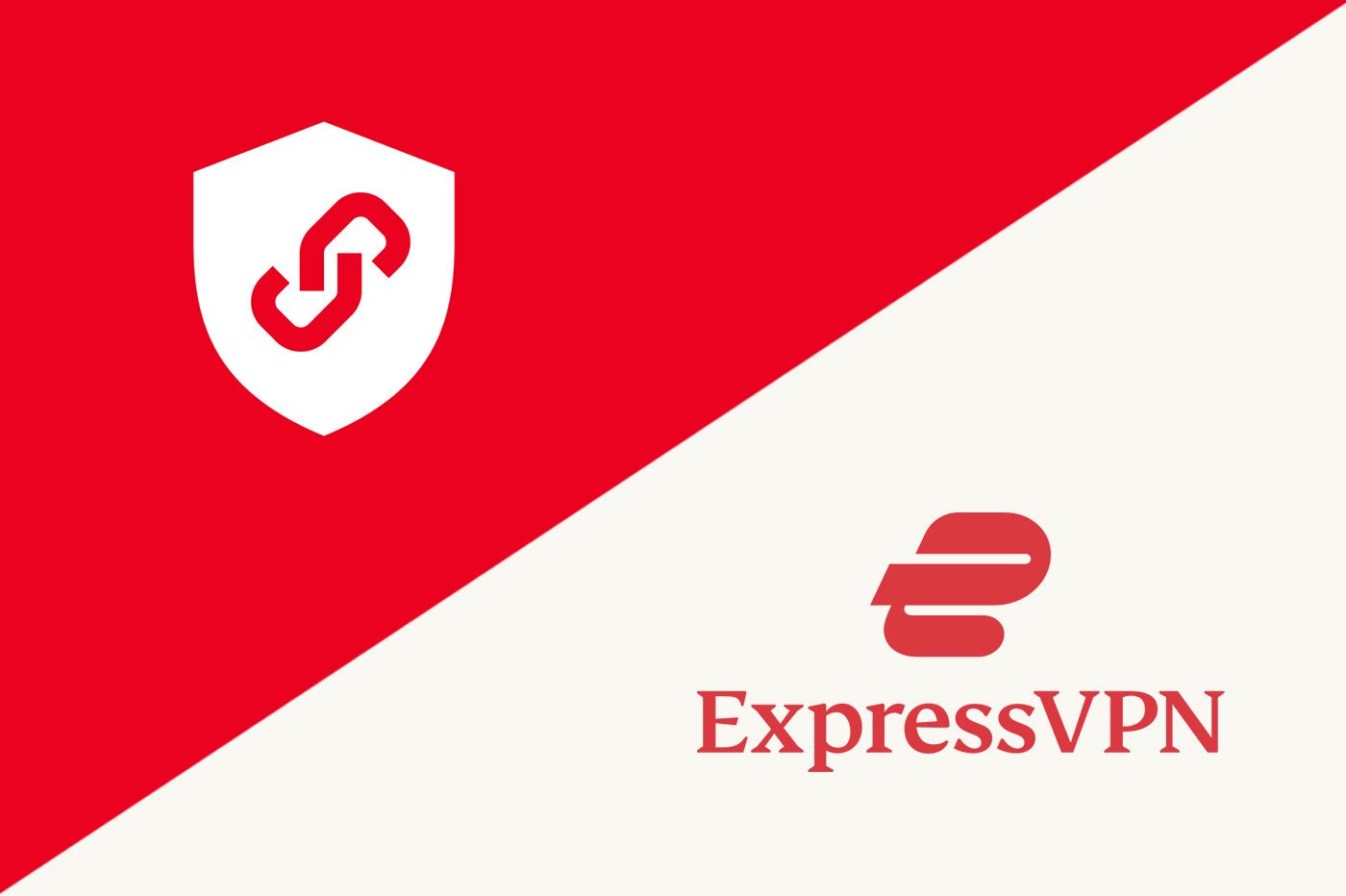
Bitdefender VPN vs ExpressVPN: Apps & Ease of Use
Apps and device support are vital for each VPN. You want a provider that supports all your devices with native, easy-to-use clients. Well, the good news is that neither of the VPNs will disappoint, albeit, one is much better than the other even at the very start. Bitdefender VPN and ExpressVPN support typical operating systems like:
- macOS
- Windows
- Android
- iOS
The difference is that Bitdefender VPN doesn’t go above this. It’ll work on these 4 systems and that’s all. However, ExpressVPN takes not one, not two, but several steps forward. First, it supports many Linux distros, such as Mint, CentOS, Arch, Fedora, and plenty more.
Next, there’s a native application for Apple TV, which VERY few VPNs offer nowadays. This means you can download and install the VPN directly on Apple TV rather than installing a VPN on a router beforehand. One downside is that Bitdefender doesn’t support Fire TV, for example.
As expected, ExpressVPN fixes this problem by introducing yet another native client for this streaming device. Since we also mentioned routers, Bitdefender doesn’t support them, while ExpressVPN does. Plus, ExpressVPN offers SmartDNS for streaming on every device.
Bitdefender VPN is crippled in this regard, so it limits you, again, to four basic platforms. Finally, we should address their simultaneous connections.
Bitdefender VPN takes a small lead here with 10 of them, while ExpressVPN is capped at 8. For some of you, this will be a large difference. For us, it’s not.
Bitdefender VPN
Regarding ease of use, Bitdefender VPN’s application looks quite nice. Below, you can see its simplistic interface allowing easy access to all the features and servers. The app looks similar on iOS/Android systems too, so switching between your PC and phone will be smooth.
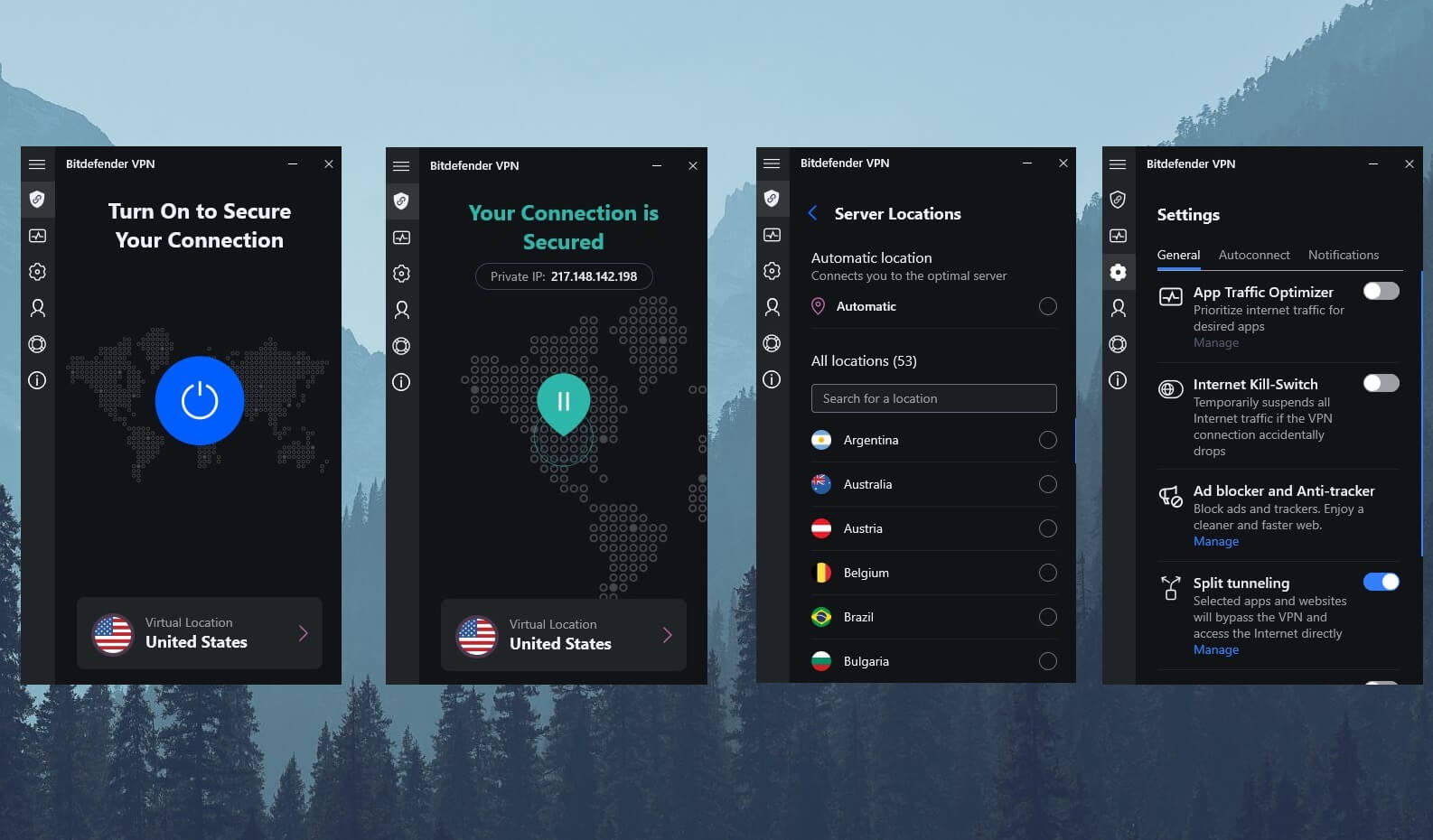
A connection button takes the middle portion of the app, while underneath, you can find the servers list. Clicking once here displays all locations and you can use the search bar to narrow your search. One-click on the server is enough to connect to it promptly.
We like that Bitdefender VPN is snappy, so the connection time is extremely brief. Another benefit of this app is its Settings menu, which holds all important features in the General tab. Here, you’ll find its kill switch, ad blocker, split tunneling, and much more.
Preferences are also easily accessible here and they’ll let you change the behavioral side of the application. No doubt, this VPN’s apps are optimized pretty well, especially on mobile devices where they possess pretty much the same features.
However, we’d like to see its apps come to more platforms. Offering just 4 of them and excluding Firestick or Linux sounds ridiculous because Bitdefender VPN is a premium service.
ExpressVPN
ExpressVPN’s interface is similar to that of Bitdefender VPN. But in our opinion, it’s even simpler.
Below, we can see that the provider takes a different approach. It uses a light-themed app with a large connection button in the middle. Needless to say, a click on it will make the provider connect.
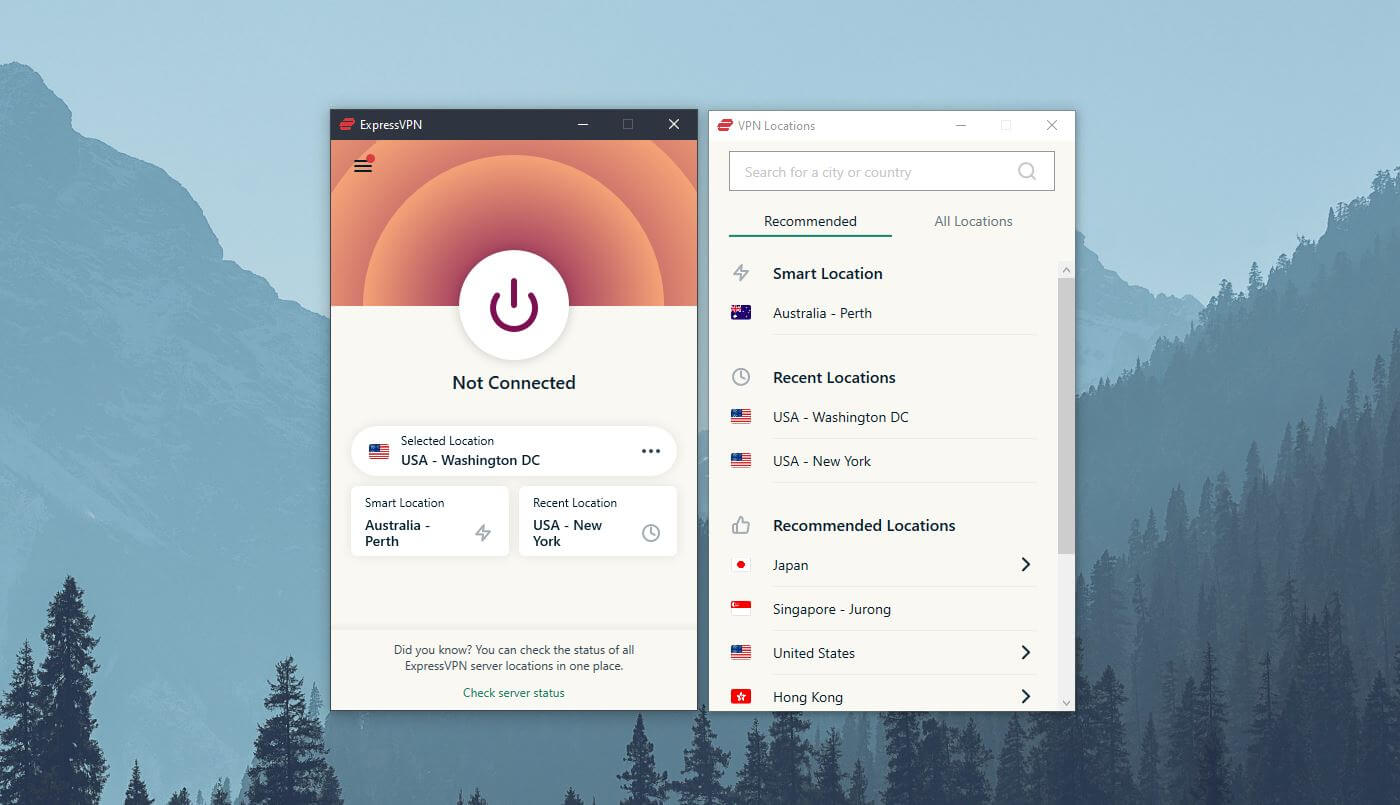
Under the “Selected Location” menu, you’ll find the server list. Just click on this menu and a separate window with the server locations will open. ExpressVPN uses a search bar at the top too and even allows you to select particular cities and not only countries – nifty.
Now, to open Settings, use the three horizontal lines in the top-left corner. This menu houses all VPN features, one of which is a kill switch. You’ll also find split tunneling here, the selection of protocols, and the option to use Advanced Protection, which we’ll discuss later.
ExpressVPN’s app is extremely simple and snappier than Bitdefender VPN. Henceforth, connecting to servers will take literally a second compared to 2-3 seconds in its rival. The mobile apps are done well too, with iOS/Android apps looking identical to their Windows/macOS counterparts.
In this ExpressVPN vs Bitdefender VPN test, the first provider offers a Linux app, alas, with no GUI. Still, better to have at least some app than none.
Who Wins?
Okay, so who wins this round, Bitdefender VPN or ExpressVPN? Well, Bitdefender has 2 more simultaneous connections but apart from that, ExpressVPN WINS because it’s slightly easier to use than Bitdefender VPN and offers incredible compatibility with all platforms.
Security & Privacy: Which One Is Safer to Use?
When discussing ease of use, it’s vital to know it’s not that important compared to safety and security. Regardless of the complexity of the app, you’ll get used to it at one point. But if the provider isn’t secure, that’s something you wouldn’t be able to get over.
Let’s find out in this section of the Bitdefender VPN vs ExpressVPN comparison.
Security Features
For this reason, we’ll discuss both provider’s security features in this ExpressVPN vs Bitdefender VPN duel.
This section is reserved for so-called shared features that both providers have. Let’s start with encryption. AES-256-bit encryption is used by both providers, which adhere to the strongest encryption standard found in other VPNs.
This encryption is impenetrable as well, so no worries on this side. Both providers come with an automatic kill switch, preventing IP leaks if the VPN connection breaks for some reason. We mentioned split tunneling and the good news is that both services have it.
Blocking ads with a VPN isn’t alien to us and that’s why it’s not strange that both can do it. ExpressVPN’s Advanced Protection is great against ads and trackers, while Bitdefender’s solution does an equally amazing job. One different thing is Parental control, however.
This is ExpressVPN’s feature that can block porn sites to keep your children safe online. Finally, there’s obfuscation in both providers. However, it’s working so much better in one of them – you’ll see which one when we talk about bypassing Chinese censorship.
What Are the Differences?
At first, Bitdefender VPN and ExpressVPN seem very similar but they’re not. We haven’t mentioned their protocols and it’s interesting to do that because they use proprietary solutions. Bitdefender VPN relies on a protocol called Hydra. If it sounds eerily familiar, it’s because it’s used by Hotspot Shield, UltraVPN, and Betternet.
This protocol uses OpenVPN TLS to provide fast speeds and rock-solid security. However, it has no notable third-party audits and generally speaking, isn’t very popular compared to, let’s say, WireGuard. ExpressVPN offers a protocol called Lightway but also gives you the choice to go with OpenVPN.
Now, Lightway is a prodigy in the VPN world, providing extreme performance while not being resource-taxing to your PC or mobile device. The company hasn’t divulged its secret recipe for this protocol but we can assume it either uses OpenVPN or WireGuard. Either way, it’s awesome, as you’ll see later.
Bitdefender has a handy feature that’ll automatically connect you to the VPN server when visiting particular types of sites. These include gambling, file sharing, or adult sites, for instance. Disappointingly, the provider has no RAM servers. For a premium provider, it’s a big downside.
ExpressVPN fixes this problem by basing all its servers on RAM for added privacy and reducing the possibility of compromising its servers. Private DNS servers are here to secure your DNS requests and prevent DNS leaks that your ISP could take advantage of.
Sadly, the feature is present only in ExpressVPN and Bitdefender VPN lacks it. So, in short, in this ExpressVPN vs Bitdefender VPN comparison, the provider with RAM-only servers and Lightway (ExpressVPN) takes the lead.
Is There a No-Logs Policy?
Can you imagine using a provider that stores logs? This sounds disgustingly filthy and if you answered NO, we can all but disagree with you. In this part of our Bitdefender Premium VPN vs ExpressVPN comparison, we’ll quickly blitz through each provider’s privacy policy to see if it keeps logs.
Bitdefender VPN
In our Bitdefender VPN review, we mentioned that the company is based in Romania. This is great news because it’s in the same country as CyberGhost. CyberGhost is a privacy giant but is this provider the same? Let’s look at its privacy policy.
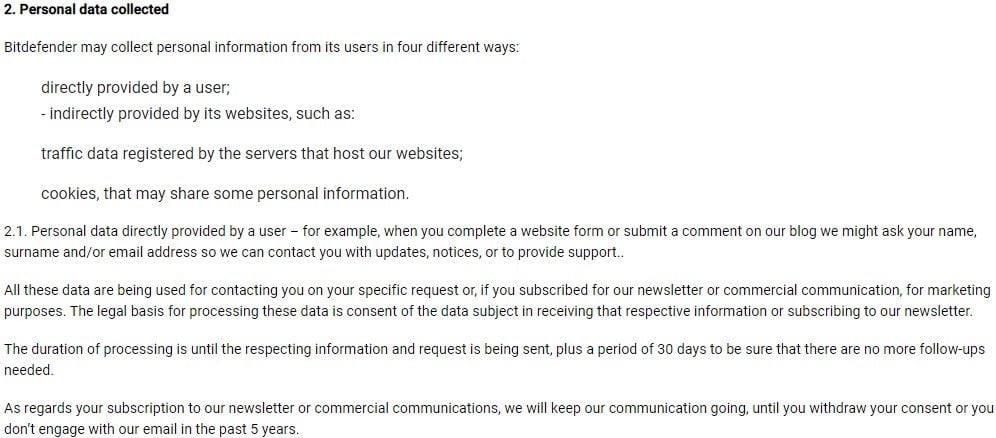
If you’ve read it and you have no clue what’s going on, welcome to the team. Bitdefender is as vague as it gets. We went a few steps ahead and contacted its support to find out that the service stores no logs of your online history, IP address, traffic logs, geolocation, and so forth. Great news.
It stores *some* information that it can keep for up to 10 years but again, we don’t know which information. We can only guess it has to do with your email, payment method, or similar stuff. As of recently, the provider has been awarded a security audit from Aon Cyber Solutions.
Now, this audit isn’t exactly independent, which makes it almost irrelevant. Aon Cyber Solutions audited Catapult Hydra and its source code. Catapult Hydra is Pango’s product and this company also teams up with Bitdefender to provide a VPN.
The problem is that Aon Cyber Solution is a “partner VPN solution”, as stated on Bitdefender’s site. It’s like your best friend vouches for you in front of a girl or guy you just met. It’s nice but doesn’t make sense, as your friend will always defend you.
Perhaps our understanding of this audit is wrong and Aon Cyberb Solutions referred to the VPN service as a “partner” because it’s shared between Pango and Bitdefender. Either way, the audit is performed on a single protocol only, so it adds no noticeable value.
ExpressVPN
ExpressVPN’s logging practices are minimal and we’ve discussed this during the ExpressVPN review.
The provider is based in the British Virgin Islands, an offshore location with some of the best privacy laws. On top of that, its no-logs policy was proven multiple times, both in practice and by auditors.
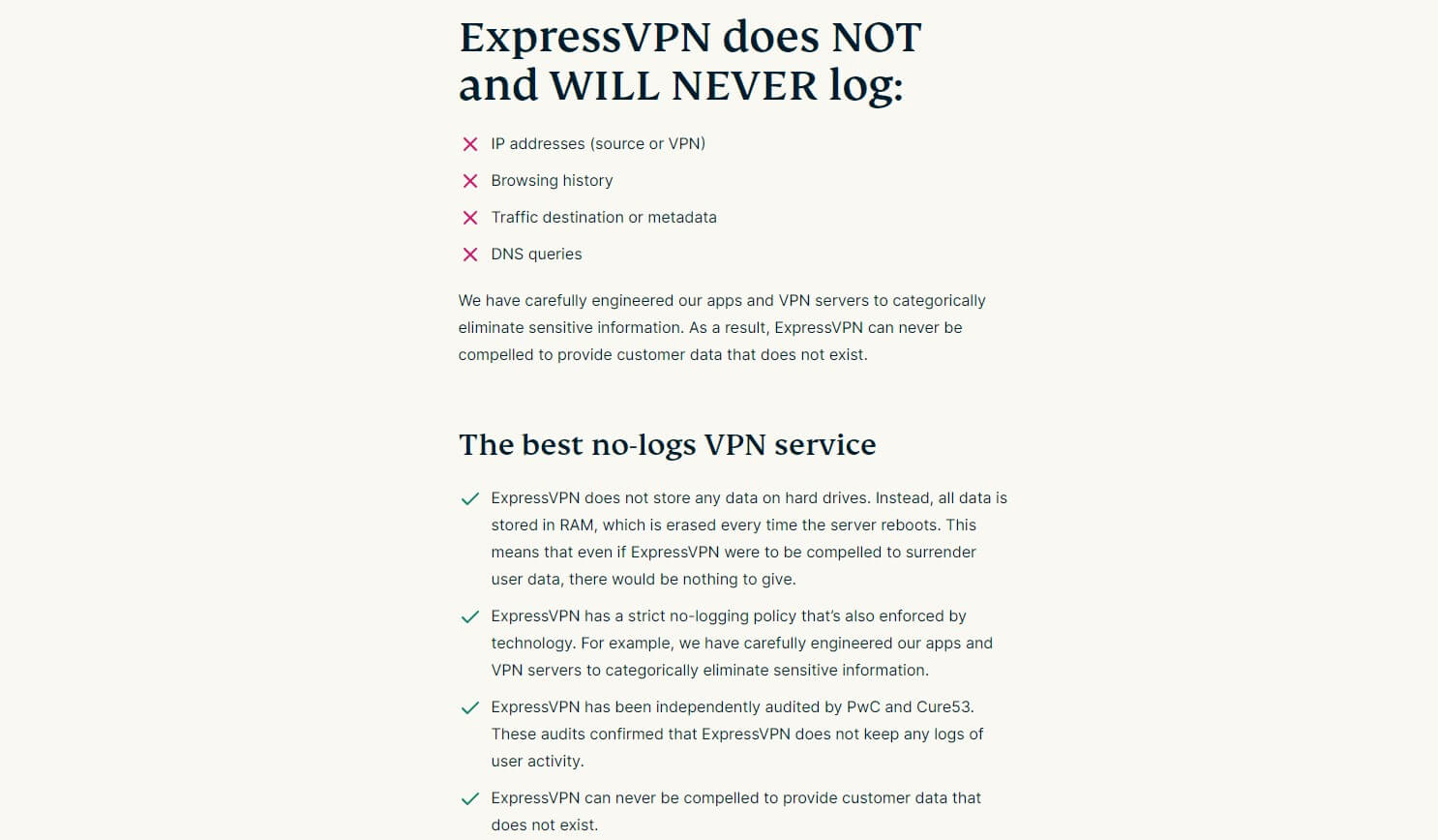
We can see that vagueness isn’t what ExpressVPN relies on. Instead, it directly states that no logs of your browsing history, traffic metadata, DNS queries, and IP addresses are stored. Also, RAM-only servers back this up, with several independent audits.
ExpressVPN’s audits come from the biggest auditing firms, including Cure53, PwC, and KPMG. All of these audits are located on its site and you can read their assessments freely. The provider is so safe and secure that it offers this well-known bug bounty program.
A hacker who manages to compromise the provider’s security will get a one-time reward of $100,000. So far, we haven’t heard of any winners, which should tell you everything you need to know about its security measures.
Who Wins?
Without a doubt, ExpressVPN WINS this round against Bitdefender VPN. Not only it offers more security features but it’s also better at protecting your privacy. Its straight-to-the-point no-log policy is trustworthy and the inclusion of RAM-only servers (TrustedServer technology) makes the provider much more “premium.”
ExpressVPN vs Bitdefender VPN Streaming Test
If you’re looking for a VPN to unblock geo-restricted streaming services, will Bitdefender VPN or ExpressVPN suffice? Starting with Bitdefender, the provider doesn’t advertise itself heavily as being a provider for this purpose. However, our tests imply that it’s not all bad.
For example, unblocking Netflix US was possible with it, which was a pleasant surprise. However, other libraries are pretty hard to access and you’ll struggle to get it working. Also, BBC iPlayer works well with this VPN but some hard-to-unblock US TV channels seem to frequently detect Bitdefender VPN.
We tried to enable obfuscation but this didn’t help much. In terms of the overall experience, Bitdefender is just enough if you’re a non-demanding user. 4K streaming will be possible too but if you go for a very distant server, 720p or 1080p should be your choices due to speed reductions.
ExpressVPN won’t reduce your speed significantly, if at all. Streaming with it is smooth as butter and watching Netflix blockbusters in 2160p was a blast using our Premium plan. Compared to its rival, it’ll unblock roughly 15 catalogs, including the US, Japan, and Canada – pretty impressive.
Where Bitdefender VPN fails, ExpressVPN shines, and that is unblocking other platforms. ExpressVPN can access ALL prevalent streaming portals and TV channels. Many use it to stream F1 races live, for example, while others enjoy Crunchyroll and revel in thousands of anime episodes.
Besides, ExpressVPN offers SmartDNS as well. This will let you set it up on any device, including the older gens of Firestick. With it, you can access mostly US-based platforms like Disney+, HBO, and plenty of others. Bear in mind that Bitdefender VPN lacks this feature, making it inferior either way.
Who Wins?
ExpressVPN WINS this round by easily beating Bitdefender VPN. In simple words, it’s much more reliable for streaming, not only on Netflix but on other platforms as well. Being faster, which we’ll address in a second, the quality of streaming will be a cut above.
ExpressVPN vs Bitdefender VPN Speed Comparison
While we spoiled the results of this round, it’s still handy to perform direct speed tests and see just how much faster the provider is in this ExpressVPN vs Bitdefender VPN duel. We first need to go through a few parameters, one of which is our native internet speed.
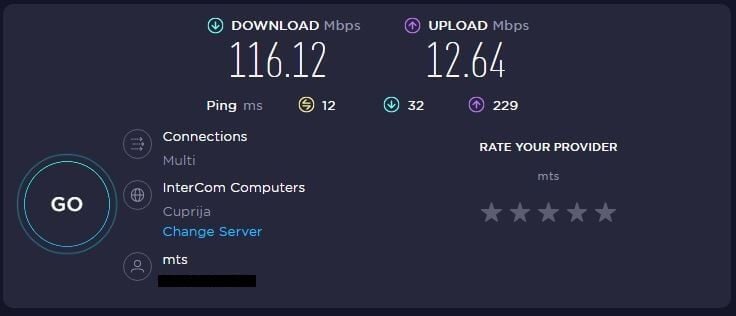
At the time of writing, we were in Serbia, a southeastern European country. Both providers are tested for 3 days in a row, 3 times a day, and using 4 server locations. These locations include the UK, the US, Australia, and Japan. Vital to mention is the protocol we used.
In ExpressVPN, we left it on Automatic, which means Lightway, as OpenVPN is seldom used by the provider. Bitdefender VPN, on the other hand, relies on Hydra by default, so this provider was, willingly or unwillingly, our go-to choice.
With that out of the way, our speed test results are below. Let us go through them together and see what they have to “say.”
ExpressVPN
UK:
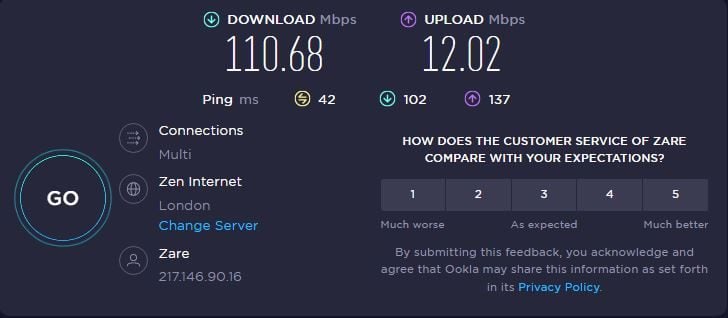
US:
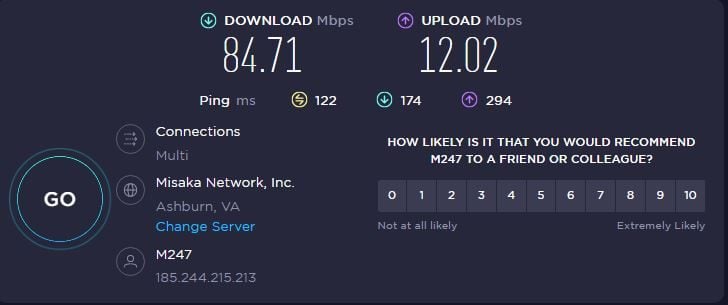
Australia:
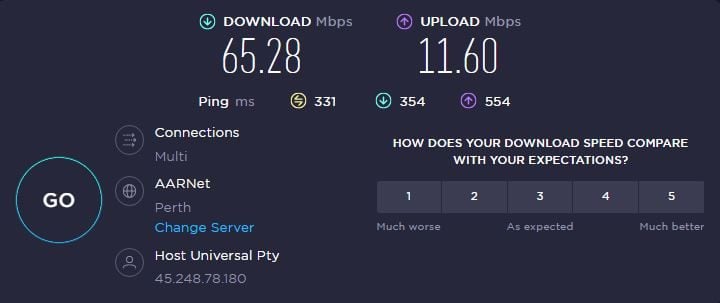
Japan:
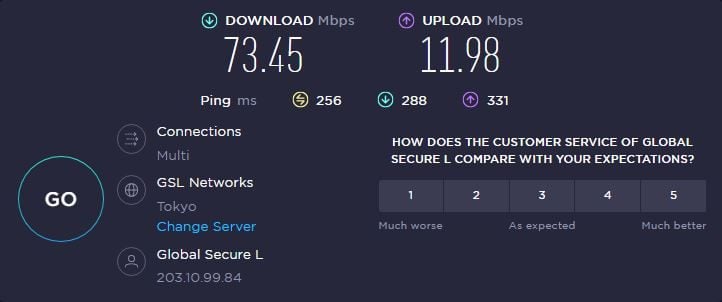
Bitdefender VPN
UK:
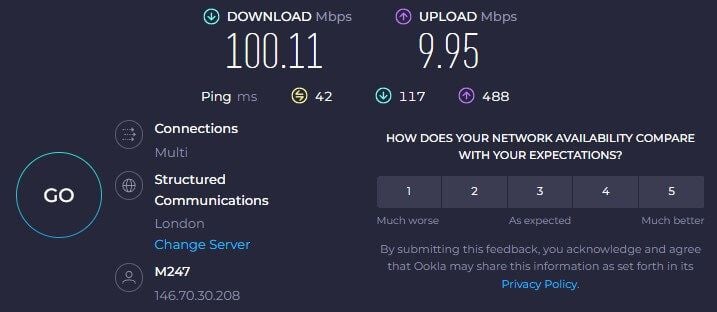
US:
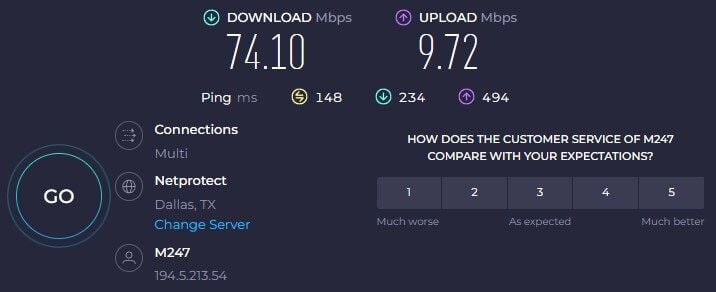
Australia:
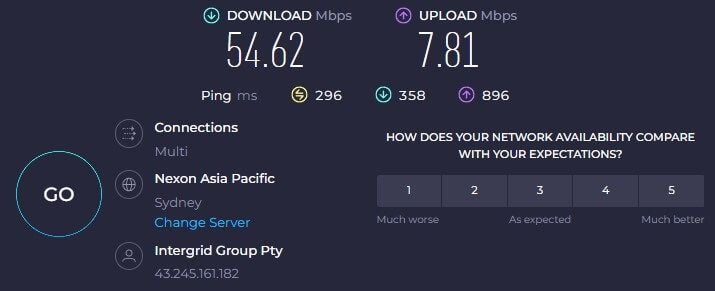
Japan:
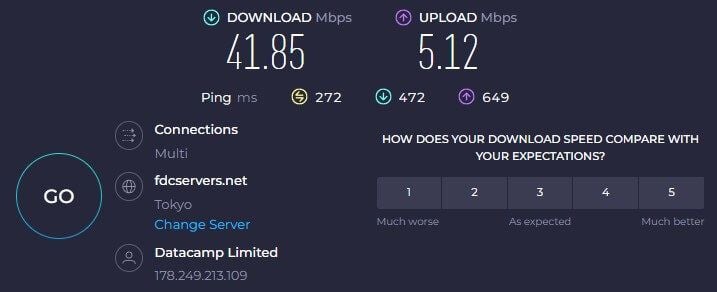
Who Wins?
Bitdefender VPN or ExpressVPN, which is faster? Obviously, ExpressVPN WINS yet another round at the expense of Bitdefender VPN.
While Bitdefender VPN isn’t slow by any means, ExpressVPN is simply much faster, there’s no denying that. Look at all 4 tests back to back and you’ll see ExpressVPN winning in each.
Even if we examine its upload speeds or latency, the provider remains a winner. For example, the Australian server favors Bitdefender latency-wise but that’s a small and negligible difference. Overall, though, ExpressVPN ends up being at least 30% faster – sometimes more, sometimes less.
Torrenting: Bitdefender VPN or ExpressVPN?
The Pirate Bay is now a shadow of its former self. However, despite its detriment, torrenting is no less popular and many are still enabling VPNs with each P2P session. In this case, you might be wondering if ExpressVPN or Bitdefender VPN are worth your money. In short, they are.
ExpressVPN’s servers are all P2P-optimized, which ensures fast, secure, and private torrent downloads and uploads. Thanks to its encryption and other security features, torrenting is unbelievably safe, even when talking about people in the US, with copyright trolls, ISP surveillance, and other problems.
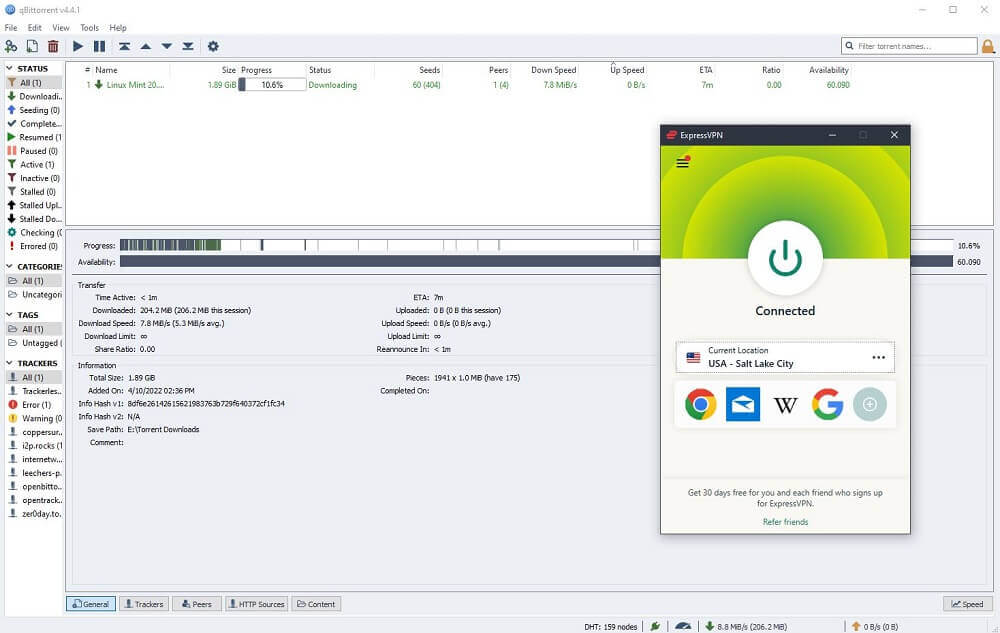
Given its amazing performance, you’ll notice zero speed reductions when torrenting. Everything is smooth and both upload and download speeds will be at their highest. Just pick the server closest to you to maximize the performance and start the P2P engine – you’ll be amazed.
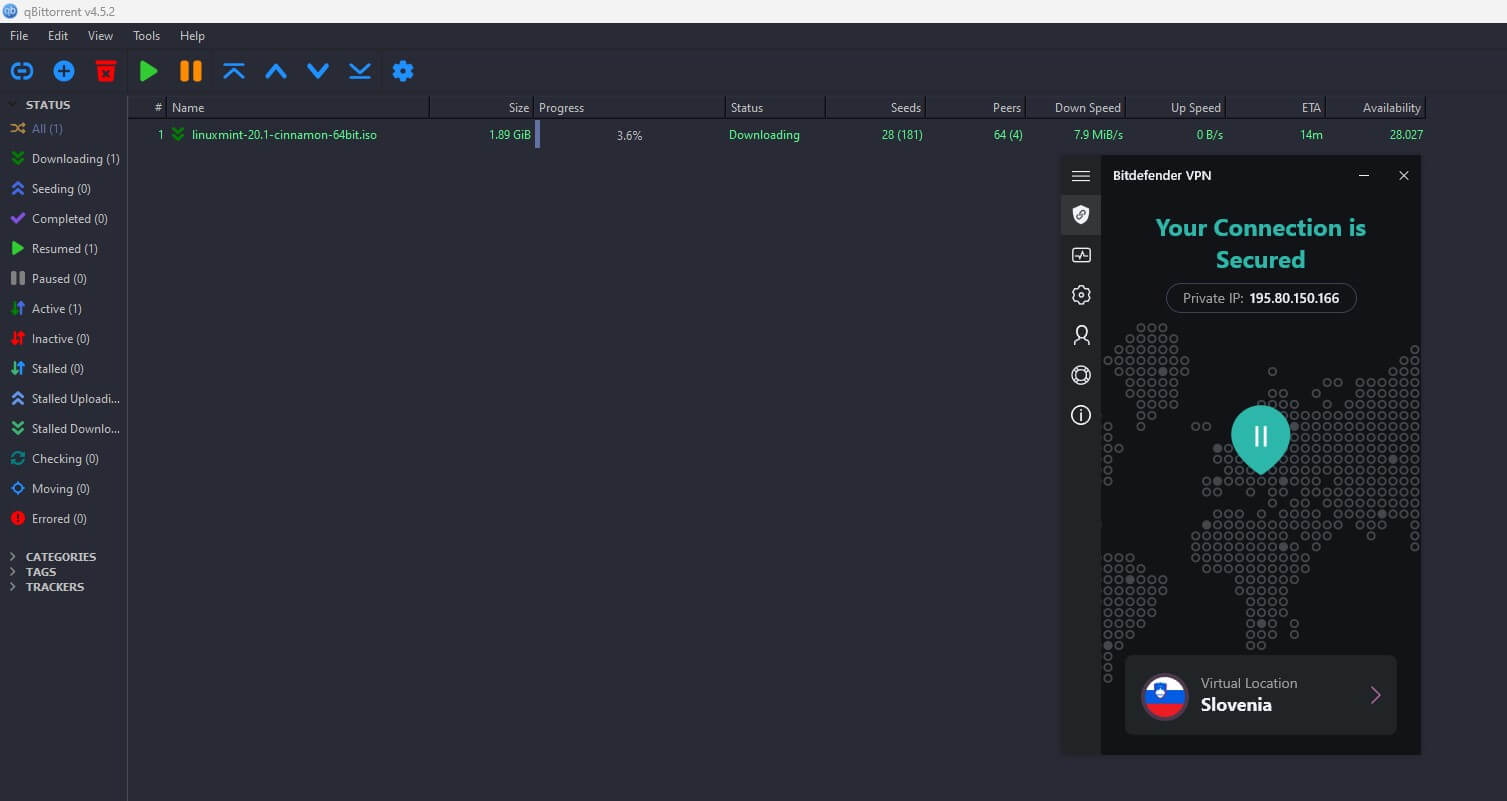
Bitdefender VPN should also be laurelled for its torrenting capabilities. Like its rival, it doesn’t have any dedicated servers, instead, all of them are ready for P2P. Again, you’ll need to connect to a server and initiate the download without any problems.
Despite being slower, Bitdefender VPN shows decent performance across the board. Granted, using long-distance servers will reduce your performance but not by much. The problem with this VPN is its vague privacy policy, which makes torrenting… well, a bit of a grey area for us.
Who Wins?
This comparison is tough but ExpressVPN WINS by a tiny margin. For one, ExpressVPN is faster for torrenting, and two, it’s better than Bitdefender VPN at keeping no logs. Bitdefender VPN’s privacy policy isn’t the clearest and it doesn’t offer RAM-based servers, making it a slightly unsafer option than its opponent.
Are ExpressVPN and Bitdefender VPN Working in China?
Obfuscated servers in NordVPN do an amazing job of bypassing censorship in China. At first, ExpressVPN seems like it doesn’t offer this feature but it does. Every server is “obfuscated” and each connection comes with in-built obfuscation that applies automatically.
This makes the provider a joy to use in censored countries because you don’t need any tech-savvy tweaks. Connect to a server, go online, and enjoy your time. Needless to say, ExpressVPN works in China but also in other similar countries like Qatar, the UAE, Turkey, Russia, and many more.
It often tops the lists of the best VPNs for Saudi Arabia as well – another censored country. At the same time, the provider’s performance doesn’t drop, so even though obfuscation will protect you, you’ll still revel in fast speeds for streaming, surfing the web, or gaming online.
Bitdefender VPN offers obfuscation – a helpful addition. But have you ever heard about anyone using it in China? Likely not because it doesn’t work! During our extensive review, our testers concluded that it won’t connect at all, despite fiddling around its security features.
The provider is limited to Hydra, which doesn’t seem to be the best option for this purpose. Besides, we’re pretty sure the company didn’t optimize its service for circumventing censorship. This is a “lite” VPN with basic or slightly above basic capabilities.
In mildly censored countries, you can expect it to work. By this, we mean the UAE, Qatar, and a few others. During severe VPN crackdowns in Turkey or Russia, Bitdefender VPN will most likely suffer.
Who Wins?
Yet again, ExpressVPN WINS the round confidently against Bitdefender VPN. While ExpressVPN works without bigger problems in China, Bitdefender VPN lacks the proper “firepower” to bypass the Great Firewall. This alone is enough to declare it a loser in this ExpressVPN-won match.
Bitdefender VPN vs ExpressVPN Server Fleets
With Bitdefender VPN suffering major losses, perhaps it’s time to redeem itself through the server park. Or is it? Well, let’s get right into it and see…
Bitdefender VPN (4,000+ servers in 50+ countries)
Bitdefender’s server fleet is surprisingly vast for a VPN of this type. At the moment, we’re looking at more than 4,000 servers in 50+ countries. With these numbers, the provider is easily in the top 6-8 VPNs currently, although its number of countries is a tad lower.
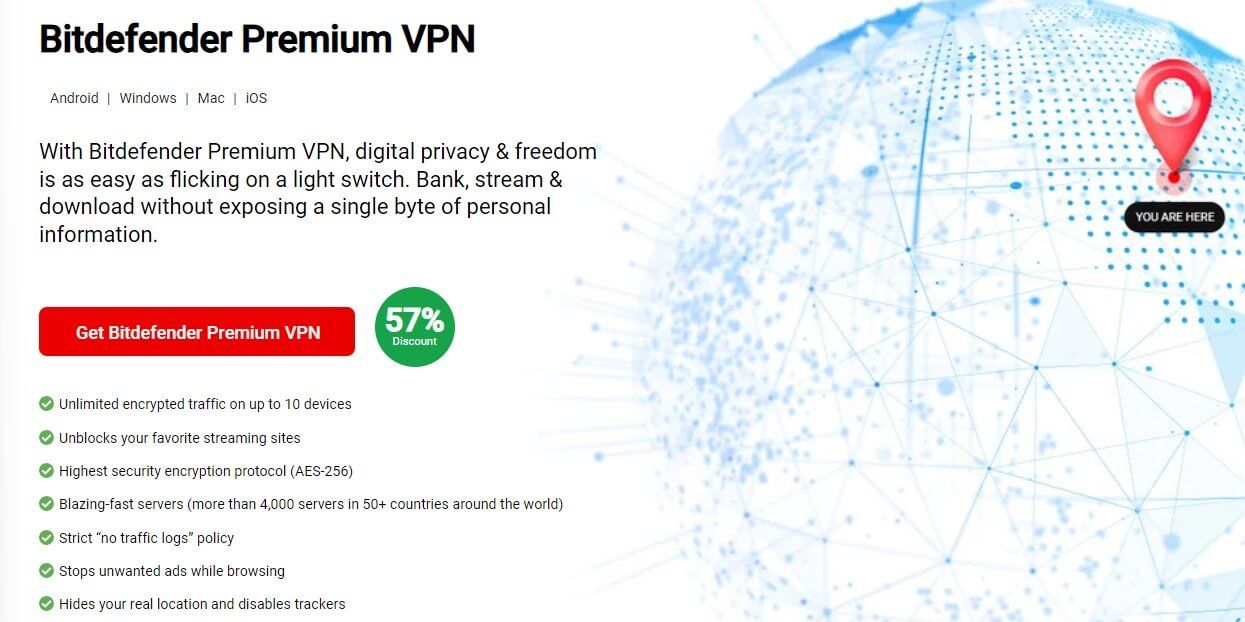
The good thing is that its server distribution is stellar. Servers in the US are the most prevalent but you’ll find plenty of them in Europe, Asia, and South America. African servers aren’t the most ubiquitous but they’re not particularly popular either. At least for most people.
For us, the biggest complaint is that Bitdefender VPN has no RAM servers. Its server fleet is based on traditional HDDs. They’re easier to compromise and harder to update, with the performance that reflects now obsolete technology. We’re not sure if the service also has 10 Gbps servers.
However, based on everything we’ve seen so far, we could say that it has. Well, at the very least in major locations like the US, the UK, Canada, and Japan. Other “less important” servers might be between 1 Gbps and 10 Gbps to preserve network stability and save money.
ExpressVPN (3,000+ servers in 105 countries)
ExpressVPN is held to a higher standard because of its renowned qualities. Its recent update to the server fleet brought the provider above that standard, as it now has significantly more than 3,000 servers in 105 countries. Right from the get-go, it offers 2 times more countries.
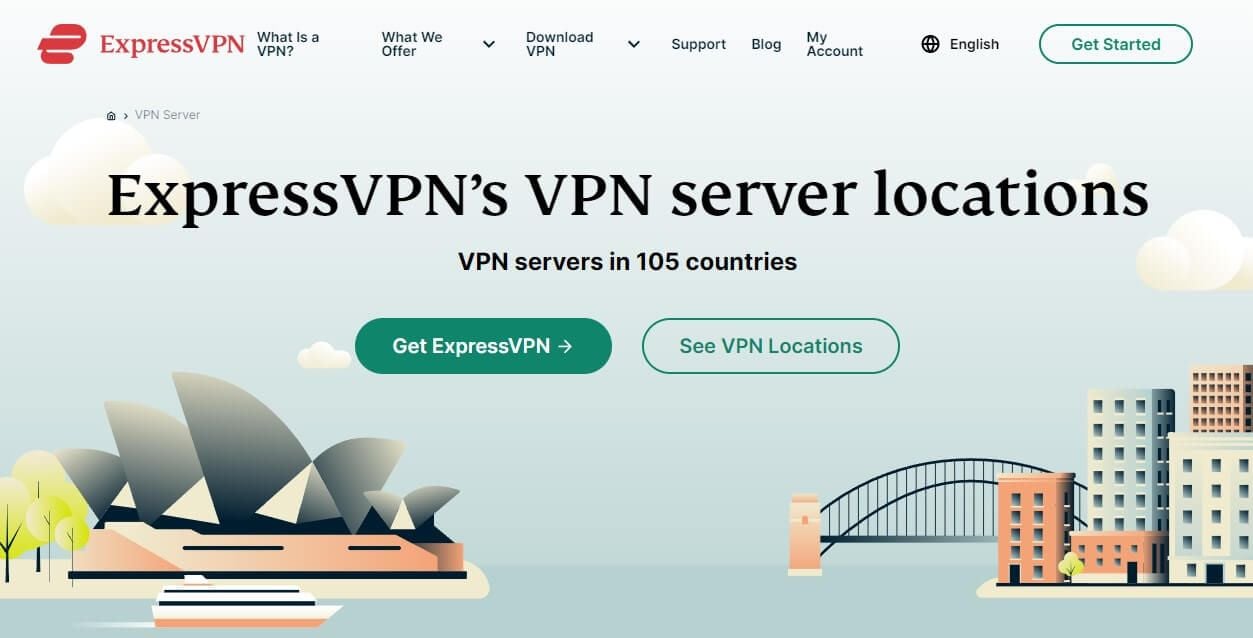
With 105 countries, ExpressVPN offers plenty of locations to pick from. Thus, geo-spoofing and altering your online location is a one-second job. We dislike its absence from the UAE, where, for some reason, the company isn’t present. But in all other relevant countries, you’ll find its servers.
The US alone has 1,000+ servers, while each country comes with several cities to pick from. While we’re in the US, this country has 22+ locations, which is mind-boggling. Countries like the UK, Canada, Japan, Australia, and others are covered with at least 3-4 or more cities.
This is useful for getting over regional blocks and accessing sites and platforms available only in certain cities. Unlike its opponent, the provider proudly brags about RAM-based, 10 Gbps servers. This is a fine quality that only the best of the best providers will offer, which this one surely is.
Who Wins?
Bitdefender has 1,000 more servers than ExpressVPN but in only 50 or so countries. Its rival has 105 countries, better-quality servers, and more locations to pick from. Do we need to say it again? ExpressVPN WINS. That much is clear.
Customer Support: ExpressVPN or Bitdefender VPN?
Bitdefender VPN comes with state-of-the-art customer service akin to similar bigger companies. Since it houses many products, including its antivirus, the scope of the support team is larger. This means that, aside from email support, users can reach the company through 24/7 live chat and phone.
Yes, there’s even phone support, albeit, this would be our go-to option only in the case of more complex problems. The worldwide number is included, which is good news, so you don’t have to be in the US or any English-speaking country to properly get help.
We recommend using 24/7 live chat support because it’s fast to respond and provides plenty of help. This is combined with various FAQs and help guides that both providers offer. Speaking of the other provider, ExpressVPN’s customer service is, coincidentally, among the best out there.
It doesn’t offer phone support, which you can call a downside. However, its live chat service works 24/7 and is unbelievably responsive. So much so that it’ll respond in virtually 5-10 seconds. Email support is fast too, with response times that seldom go over 20 minutes.
We like ExpressVPN’s easy-to-grasp FAQs and help center articles plus a YouTube channel where you can find out more about the company. ExpressVPN’s activity on social media is impressive and users can contact the company even using this measure.
Who Wins?
This round is a DRAW, as Bitdefender VPN and ExpressVPN show impressive levels of customer support. Everything from email and live chat to phone support is here, making these companies reliable and ready to tackle your issues promptly.
Bitdefender VPN vs ExpressVPN Pricing Comparison
For many of you, the last round of our Bitdefender Premium VPN vs ExpressVPN analysis, which is about pricing, will be the most relevant.
Many people wonder how much a VPN costs. Let us see which service is cheaper, and thus, more suitable for your wallet.
Bitdefender VPN
Bitdefender VPN comes in first, with its rather attractive subscription plans that you’ll no doubt find enticing, although not the most numerous.

You can see that the provider offers just two plans. The monthly plan is priced at $6.99, while the 1-year plan is currently discounted by 50% and costs $2.92 a month. Of course, the annual plan is paid upfront, which will be roughly $35 for the first year.
We must admit this price looks… well, VERY attractive, especially for users on a shoestring budget. To that, we should add a 30-day refund policy, which allows for reimbursement in the case of dissatisfaction. Bitdefender VPN doesn’t support any advanced payment methods, however.
This means you’ll be limited to your credit card, PayPal, or wire transfer only. Paying for a VPN with crypto is sometimes better, as the payment will be anonymous.
ExpressVPN
Don’t worry. ExpressVPN fixes this problem and includes crypto, credit cards, PayPal, and other methods like Sofort, UnionPay, GiroPay, and many more.
But how much does it cost? The same as always – here are its subscription plans.

You can see right away that it’s more expensive. The annual plan in the middle sits at $6.67 a month and it’s discounted by 49% with 3 FREE months on top. This is an exclusive deal for our readers that can be claimed directly through our sites. Its monthly plan is a whopping $12.95.
This one, we don’t recommend for obvious reasons. Lastly, there’s this 6-month plan, which we think is the least popular, as it costs $9.99 a month. Each plan is covered by a 30-day money-back guarantee, so if you end up ambivalent about the VPN, you can get a refund.
Who Wins?
All things considered, Bitdefender VPN WINS the pricing round over ExpressVPN. While not better by any stretch, its cheap prices are hard to deny, especially in the face of ExpressVPN, which is multiple times more expensive.
Conclusion: ExpressVPN Beats Bitdefender VPN!
After doing math, the result is 8:2 for ExpressVPN, which confidently wins the battle against Bitdefender VPN. We could say it was a close call but we’d be lying. The winning provider is a much better option in every way. From speed, security, and ease of use to privacy, streaming, torrenting, and compatibility.
In our ExpressVPN vs Bitdefender VPN analysis, the latter was significantly cheaper and we must praise it for this. Considering its qualities, this provider is far from being opulent. Its customer service was up to par as well, with phone support that ExpressVPN doesn’t offer.
Sadly, everything else goes to ExpressVPN. It’s more expensive but the gap in quality is just as large. This always reminds us that less affordable providers almost always end up being superior. Except if we’re not talking about NordVPN which is better than Bitdefender VPN.
All in all, our recommendation is simple. Buy ExpressVPN. If you don’t have enough for it, get NordVPN or CyberGhost. They’re both awesome. Or just save up some money on the side, and when ready, get ExpressVPN’s discount on our site. Thank us later. Or don’t. Your choice.